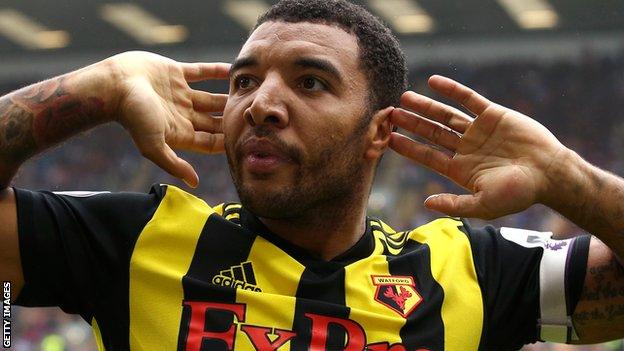Meeting the real Troy Deeney - what is Watford striker like when the cameras stop?
- Published
- comments

I have been a sports journalist for more than 20 years but I have not interviewed many footballers who were as open and honest as Troy Deeney was when I spoke to him for this week's Premier League Show.
That in itself was not a huge surprise - the Watford captain admits himself that he does a lot of media, and I had read and heard a lot about him and his past.
I knew he liked to speak his mind, but what ended up standing out beyond his level of candidness was how courteous and curious he was at all times, even when the cameras were not switched on.
Troy is not alone there in being polite and thoughtful - these days, most Premier League footballers have a confidence and assuredness which means they are comfortable in a range of settings and come across in a really positive way, something that was not as apparent, say, 15 years ago.
That is not to say they were all rude then, it is just more noticeable now that they show more interest in talking to the different people around the shoot, and bad behaviour around the media is just not tolerated by their clubs anymore.
Troy Deeney: Watford captain opens up about mental health
Even so, very few players I meet for The Premier League Show are as engaging as Troy was. He has made it no secret that broadcasting is an area he would like to go into when he stops playing, and he asked me plenty of questions about it.
And, when it came to him giving the answers, typically he did not hold anything back.
We discussed everything from his new diet and his physical and mental health to his role at Watford and his England hopes, and nothing about him seemed contrived.
'He is focused on improving himself any way he can'
Troy's attitude to his England chances are a good example of how he is not affected by negativity, and how he uses it to motivate him.
Gareth Southgate said recently that he was not the kind of player he was looking for, but Troy was never going to let that bother him.
Yes, playing for his country would be the number one thing in his life if it happened and he can't see why he should not be considered if he is playing well and scoring goals.
But, if it is not going to happen, he is not going to dwell on it - and it clearly has not affected his form for Watford this season.
Troy Deeney agility training
Instead, he is focused on improving himself any way he can. That includes his new diet that has seen him lose a stone, and watching re-runs of his matches up to seven times within hours of the final whistle - but also his mental health too.
That side of his life was something Troy spoke about in detail. He started seeing a psychologist to deal with personal issues and still has sessions twice a week to get him in the zone for matches.
I think for someone like him, a big strong sporting hero, to be talking about struggling like that and to acknowledge that he has been very vulnerable at times, is very powerful.
It takes time to get to a point where you can do that, of course. Troy turned 30 in the summer and he is clearly very different now to the way he was a few years ago.
From talking to him, I got a real sense of how he has developed as a person and moved on from his earlier, angrier, days - it is going to be fascinating finding out what he does next.

Deeney joined Watford from Walsall in 2010 for an initial fee of £500,000. He has scored 114 goals in 338 games for the Hornets, including two this season
A player who is not limited by other people's expectations
Playing for Watford is all Troy is focusing on at the moment, though. It was really interesting to hear him talk about what being the lynchpin at his club means to him - he admitted he loved it, and how he likes to be running things.
Troy has a real connection with the Watford fans, who admire his loyalty and seem to really love and understand him in the same way Crystal Palace supporters feel about Wilfried Zaha - both players are really at the heartbeat of their respective clubs.
I spoke to Zaha last season for The Premier League Show, and found him a fascinating character who is probably at the perfect place for him to flourish.
You could say the same about Troy at Watford, but both players have had very different journeys to get where they are.
Wilfried Zaha is feeling 'the love' from Palace fans
Zaha was labelled a star from the age of 13 and his problem was probably that he went to a big club too soon when he left Palace to join Manchester United in 2013.
In contrast, Troy grew up always being told he was never going to be good enough, and he had to fight his way to get from Walsall to the top flight.
It just shows you how there is so much more to making it to your final destination in football than just your raw talent on the pitch, and how different players can face two very different challenges.
With Zaha, you have the prodigious golden boy who has to deal with the pressure of being the next big thing.
With Troy, you have a player who decided he was not going to be limited by what other people's expectations were of him - and he should be proud of what he has achieved.
Gabby Logan was speaking to BBC Sport's Chris Bevan.